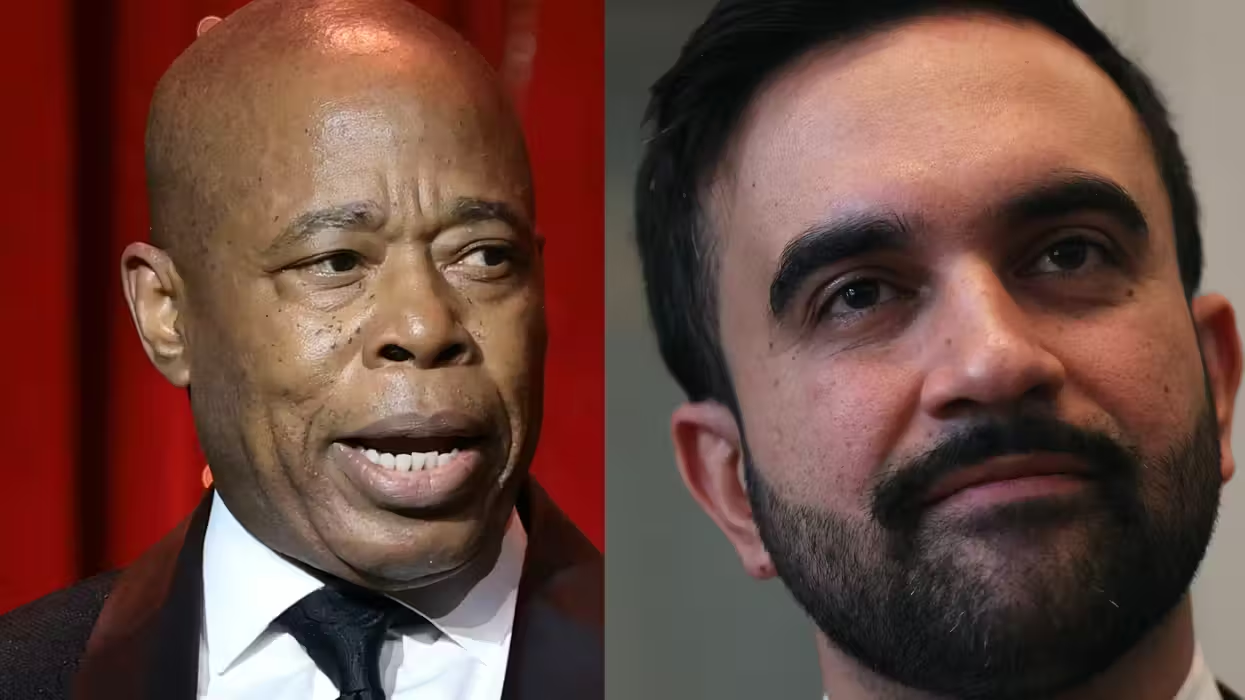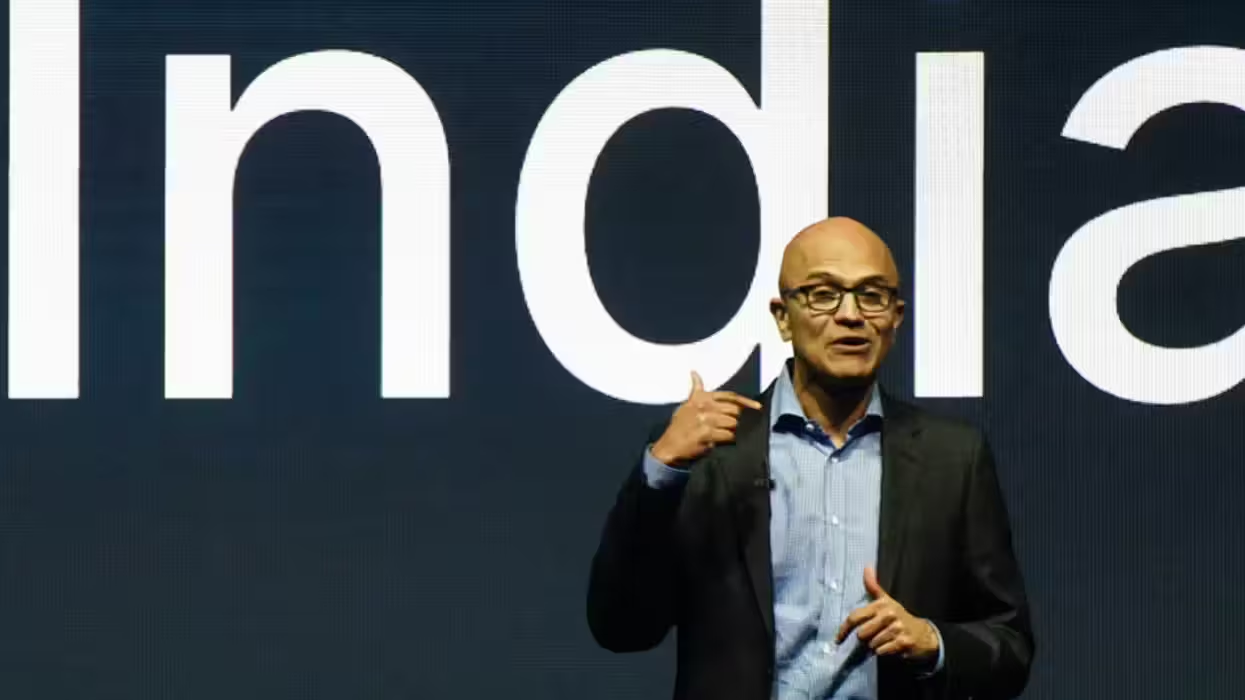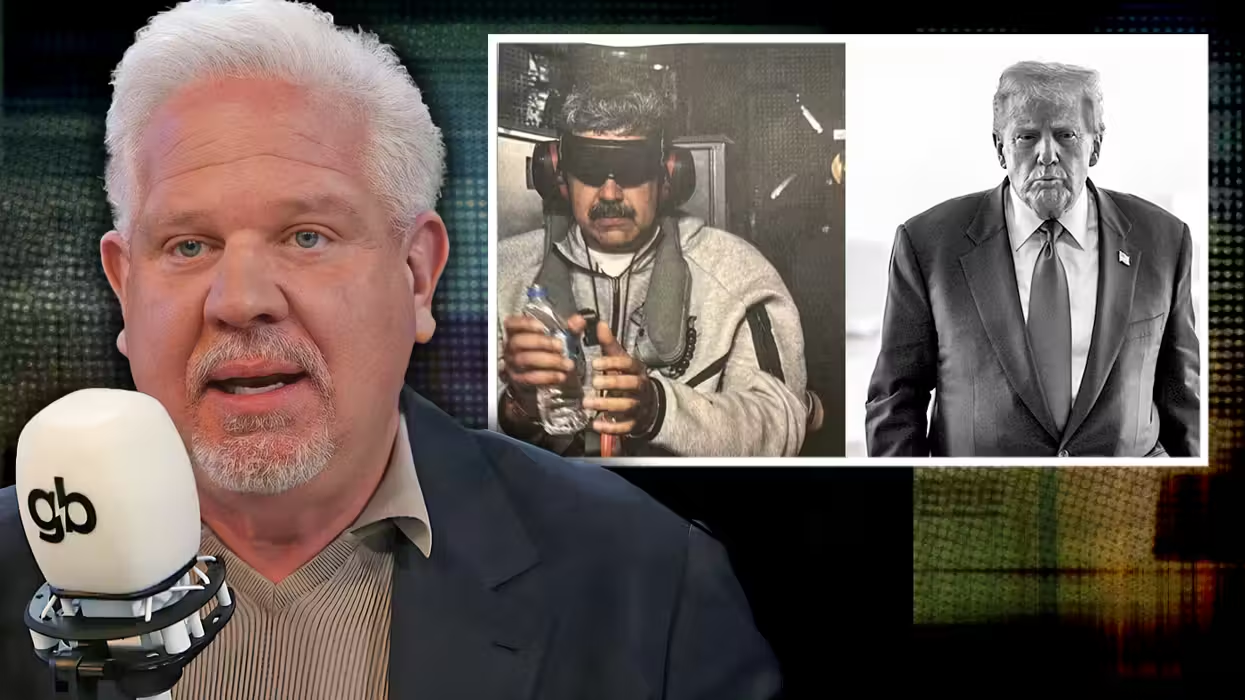
© 2026 Blaze Media LLC. All rights reserved.
Did Hillary Clinton support UN policy that would have criminalized 'Draw Muhammad' contest?
May 18, 2015
Then-Secretary of State Clinton's support for UN policy that criminalizes incitement to violence has not been heavily scrutinized.
Presumed Republican presidential candidate Jeb Bush was recently asked about the "Draw Muhammad" contest in Garland, TX that was attacked by two jihadists, and what Mr. Bush thought of event organizer and ardent counterjihadist Pamela Geller.
Democratic presidential candidate Hillary Clinton was not, but a new book gives insight into how she might think about the issue given her support as Secretary of State of a policy put forth by the Organization of Islamic Cooperation (OIC) at the UN that comes into direct conflict with the First Amendment.
 NEW YORK - SEPTEMBER 26: U.S. Secretary of State Hillary Clinton (C), talks with Laurent Fabius (R), Minister for Foreign Affairs of France, before a United Nations Security Council meeting on peace and security in Middle East on September 26, 2012 in New York City. (Credit: Getty Images)
NEW YORK - SEPTEMBER 26: U.S. Secretary of State Hillary Clinton (C), talks with Laurent Fabius (R), Minister for Foreign Affairs of France, before a United Nations Security Council meeting on peace and security in Middle East on September 26, 2012 in New York City. (Credit: Getty Images)
As Maj. Stephen Coughlin (Ret.) writes in his "Catastrophic Failure: Blindfolding America in the Face of Jihad," which we discussed at length here, the OIC put forth a "Ten-Year Programme of Action to Meet Challenges Facing the Muslim Ummah in the 21st Century" approved in December 2005, one section of which dealt with "Combatting Islamophobia."
In this area, the goal of the OIC -- which some argue serves as something of a caliphate representing 56 Islamic states and the Palestinian Authority -- specifically was to
Emphasize the responsibility of the international community, including all governments, to ensure respect for all religions and combat their defamation.Endeavor to have the United Nations adopt an international resolution to counter Islamophobia and to call upon all states to enact laws to counter it, including deterrent punishment. [Emphasis Coughlin's]
This goal was codified in UN Human Rights Commission (HRC) Resolution 16/18. The resolution entails
Combating intolerance, negative stereotyping and stigmatization of, and discrimination, incitement to violence, and violence against persons based on religion or belief...
According to Coughlin -- who in addition to being a leading advisor to the Pentagon on Islamic law is a practicing lawyer specializing in international jurisprudence -- key to HRC Resolution 16/18 in the eyes of the OIC is the notion of criminalizing "incitement to violence," as a means of "deterrent punishment." The OIC desires that
the United Nations, the European Union, the United States and all other non-Muslim countries pass laws criminalizing Islamophobia. This is a direct extraterritorial demand that non-Muslim jurisdictions submit to Islamic law and implement shariah-based punishment over time. In other words, the OIC is set on making it an enforceable crime for non-Muslim people anywhere in the world—including the United States—to say anything about Islam that Islam does not permit.
The crux of Coughlin's argument is the language contained in an interlocking web of documents including the UN's International Covenant on Civil and Political Rights (ICCPR) and the Cairo Declaration on Human Rights in Islam.
Three particular portions of the ICCPR are critical:
- Article 18: (1) Everyone shall have the right to freedom of thought, conscience and religion. This right shall include freedom to have or to adopt a religion or belief of his choice, and freedom, either individually or in community with others and in public or private, to manifest his religion or belief in worship, observance, practice and teaching. (2) No one shall be subject to coercion which would impair his freedom to have or to adopt a religion or belief of his choice. (3) Freedom to manifest one's religion or beliefs may be subject only to such limitations as are prescribed by law and are necessary to protect public safety, order, health, or morals or the fundamental rights and freedoms of others. (4) The States Parties to the present Covenant undertake to have respect for the liberty of parents and, when applicable, legal guardians to ensure the religious and moral education of their children in conformity with their own convictions.
- Article 19(2/3): (2) Everyone shall have the right to freedom of expression; this right shall include freedom to seek, receive and impart information and ideas of all kinds, regardless of frontiers, either orally, in writing or in print, in the form of art, or through any other media of his choice. (3) The exercise of the rights provided for in paragraph 2 of this article carries with it special duties and responsibilities. It may therefore be subject to certain restrictions, but these shall only be such as are provided by law and are necessary: (a) For respect of the rights or reputations of others; (b) For the protection of national security or of public order (ordre public), or of public health or morals.
- Article 20(2): Any advocacy of national, racial or religious hatred that constitutes incitement to discrimination, hostility or violence shall be prohibited by law.
Coughlin notes that the UN's "Rabat Plan of Action on the Prohibition of Advocacy of National, Racial or Religious Hatred that Constitutes Incitement to Discrimination, Hostility or Violence: Conclusions and Recommendations Emanating from the Four Regional Expert Workshops Organised [sic] by OHCHR, in 2011, and adopted by experts in Rabat, Morocco on 5 October 2012" incorporates Article 20(2) explicitly by way of a footnote on the very title of the plan of action itself.
In other words, the UN Human Rights Council defines incitement according to ICCPR standards.
The action plan further states that HRC Resolution 16/18 "requires implementation and constant follow-up by States at the national level, including through the "Rabat Plan of Action" which contributes to its fulfilment [sic]."
The plan therefore would appear to serve the ends sought by the OIC in its "Ten-Year Programme of Action."
Perhaps not surprisingly then, Coughlin reveals that during a 2012 interview, OIC Secretary General Ekmeleddin İhsanoğlu argued that the strictures of the ICCPR could be applied via HRC Resolution 16/18:
At this moment we have the Resolution 16/18 which was issued last year at the UN which forms a legal groundwork for criminalizing such actions that could lead to violence ... there is in the International Agreement for Civil and Political Rights (Year 1966 Paragraph 18), a provision that would allow us to put limits on the misuse of the freedom of speech including misuse of freedom of press, freedom of thought, the misuse of these freedoms towards others, in a sense that it would encourage to violence and to hatred based on religious belief. [Bold emphasis Coughlin's, italics ours]
But while the UN in general and OIC in particular make clear their intent to apply the ICCPR as a means of criminalizing acts of "incitement" in context of Islamophobia, the parallelism of ICCPR Articles 19 and 20 to the OIC's Cairo Declaration is perhaps most telling.
Article 22 of the Cairo Declaration -- which defines human rights according to Shariah law -- reads:
(a) Everyone shall have the right to express his opinion freely in such manner as would not be contrary to the principles of the Shari’ah. (1) Everyone shall have the right to advocate what is right, and propagate what is good, and warn against what is wrong and evil according to the norms of Islamic Shari’ah. ... (c) Information is a vital necessity to society. It may not be exploited or misused in such a way as may violate sanctities and the dignity of Prophets, undermine moral and ethical Values or disintegrate, corrupt or harm society or weaken its faith. (d) It is not permitted to excite nationalistic or doctrinal hatred or to do anything that may be an incitement to any form or racial discrimination.
Coughlin argues that this language is fully consistent with the ICCPR, again leading to the repurposing of the word "incitement" as a means to enforce Shariah compliance. He states:
It is in this context that the OIC’s "test of consequences" narrative is used to turn the meaning of incitement in Article 20 Section 2 [of the ICCPR] on its head by converting it to a legal standard designed to facilitate the "shut up before I hit you again" standard associated with the battered wife syndrome. The OIC’s Fourth Observatory Report on Islamophobia [link ours], released in June 2011, calls for:d. Ensuring swift and effective implementation of the new approach signified by the consensual adoption of HRC Resolution 16/18, entitled "combating intolerance, negative stereotyping and stigmatization of, and discrimination, incitement to violence, and violence against persons based on religion or belief," by, inter alia, removing the gaps in implementation and interpretation of international legal instruments and criminalizing acts of incitement to hatred and violence on religious grounds with a view to curbing the double standards and racial profiling that continue to feed religious strife detrimental to peace, security and stability.
e. Constructively engaging to bridge divergent views on the limits to the right to freedom of opinion and expression, in a structured multilateral framework, and in the light of events like the burning of Quran geared towards filling the ‘interpretation void’ with regard to the interface between articles 19 (3) and 20 of the ICCPR based on emerging approaches like applying the ‘test of consequences.’ [Emphasis Coughlin's]
Under the OIC’s redefinition of incitement, the "test of consequences" allows a third party to use an utterance as a provocation to violence, which then becomes sanctioned precisely because the third party acted out violently. Moreover, what criminalizes the utterance is the third party’s decision to respond violently. The "test of consequences" institutionalizes the calculated suppression of protected speech by naked use of force. This is institutionalized terrorism comfortably nested in facially neutral language.
What does a UN HRC resolution and the OIC's interpretation of said resolution have to do with Hillary Clinton?
On July 15, 2011, then-Secretary of State Clinton offered America's backing to OIC Secretary General İhsanoğlu to garner support for the implementation and ratification of HRC Resolution 16/18. Secretary Clinton stated:
I want to applaud the Organization of Islamic Conference and the European Union for helping pass Resolution 16/18 at the Human Rights Council. I was complimenting the Secretary General on the OIC team in Geneva. I had a great team there as well. So many of you were part of that effort. And together we have begun to overcome the false divide that pits religious sensitivities against freedom of expression, and we are pursuing a new approach based on concrete steps to fight intolerance wherever it occurs. Under this resolution, the international community is taking a strong stand for freedom of expression and worship, and against discrimination and violence based upon religion or belief. [Emphasis Coughlin's]
Clinton continued:
The resolution calls upon states to protect freedom of religion, to counter offensive expression through education, interfaith dialogue, and public debate, and to prohibit discrimination, profiling, and hate crimes, but not to criminalize speech unless there is an incitement to imminent violence. We will be looking to all countries to hold themselves accountable and to join us in reporting to the UN’s Office of the High Commissioner of Human Rights on their progress in taking these steps.
America apparently would be subject to this resolution, as Clinton noted that she had asked
Ambassador-at-Large for Religious Freedom, Suzan Johnson Cook, to spearhead our implementation efforts. And to build on the momentum from today’s meeting, later this year the United States intends to invite relevant experts from around the world to the first of what we hope will be a series of meetings to discuss best practices, exchange ideas, and keep us moving forward beyond the polarizing debates of the past; to build those muscles of respect and empathy and tolerance that the secretary general referenced. It is essential that we advance this new consensus and strengthen it, both at the United Nations and beyond, in order to avoid a return to the old patterns of division.
To be fair to Secretary of State Clinton, Coughlin asserts that "it is not clear that the Secretary knows OIC concepts of tolerance and human rights are based on shariah."
But, Coughlin continues, "she nonetheless committed to the underlying logic of Resolution 16/18."
Moreover, Coughlin believes that Clinton tacitly recognizes the conflict between the policy she supported at the UN and Constitutionally protected free speech, with Clinton continuing in her 2011 statement:
In the United States, I will admit, there are people who still feel vulnerable or marginalized as a result of their religious beliefs. And we have seen how the incendiary actions of just a very few people, a handful in a country of nearly 300 million, can create wide ripples of intolerance. We also understand that, for 235 years, freedom of expression has been a universal right at the core of our democracy. So we are focused on promoting interfaith education and collaboration, enforcing antidiscrimination laws, protecting the rights of all people to worship as they choose, and to use some old-fashioned techniques of peer pressure and shaming, so that people don’t feel that they have the support to do what we abhor. [Emphasis Coughlin's]
These sentiments might help to explain why Secretary of State Clinton along with President Obama felt compelled to send a message to the Muslim world in the aftermath of the Sept. 11, 2012 attacks in Benghazi disavowing any link between the U.S. government and the infamous "Innocence of Muslims."
Given what we know, one wonders what Secretary of State Clinton might say about Pamela Geller's "Draw Muhammad" event.
Note: The links to the book in this post will give you an option to elect to donate a percentage of the proceeds from the sale to a charity of your choice. Mercury One, the charity founded by TheBlaze’s Glenn Beck, is one of the options. Donations to Mercury One go towards efforts such as disaster relief, support for education, support for Israel and support for veterans and our military. You can read more about Amazon Smile and Mercury One here.
–
Follow Ben Weingarten (@bhweingarten) and TheBlazeBooks on Twitter and Facebook.
You can find all of our Blaze Books interviews on Soundcloud and Stitcher, and subscribe to our podcast automatically via iTunes.
Want to leave a tip?
We answer to you. Help keep our content free of advertisers and big tech censorship by leaving a tip today.
Want to join the conversation?
Already a subscriber?
Ben Weingarten is a writer, commentator, and editor at large at RealClearInvestigations. He is a senior contributor at the Federalist and writes columns for Newsweek and the Epoch Times.
Ben Weingarten
Ben Weingarten is a writer, commentator, and editor at large at RealClearInvestigations. He is a senior contributor at the Federalist and writes columns for Newsweek and the Epoch Times.
more stories
Sign up for the Blaze newsletter
By signing up, you agree to our Privacy Policy and Terms of Use, and agree to receive content that may sometimes include advertisements. You may opt out at any time.
Related Content
© 2026 Blaze Media LLC. All rights reserved.
Get the stories that matter most delivered directly to your inbox.
By signing up, you agree to our Privacy Policy and Terms of Use, and agree to receive content that may sometimes include advertisements. You may opt out at any time.






